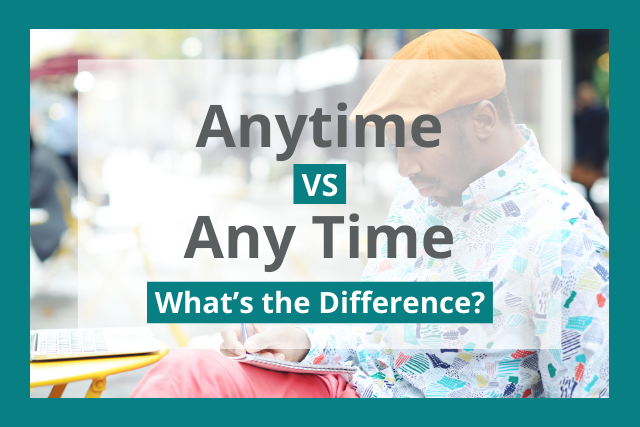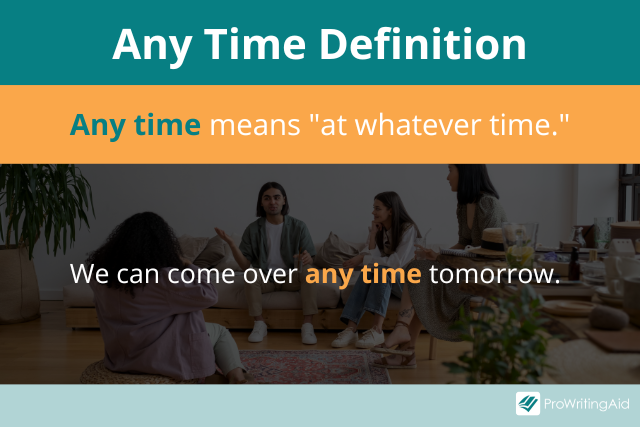
Any time and anytime are synonymous, but they are not interchangeable.
Both the one-word version and two-word version mean "at whatever time," and they can describe a time that hasn't been decided upon.
The two words, any time, can be used in any situation. The one-word phrase anytime can only be used in certain situations.
In this article, we’re going to explain the difference between anytime vs any time and share an easy trick for remembering when to use each word.
Any Time Definition and Meaning
The two-word phrase any time is a noun phrase that means "any amount of time" or "at no particular time." It is used to describe something that will happen at an unspecified time that has not, or does not need to be, agreed upon.
Any time is more formal than the more casual anytime, so you should add the space in very formal writing. You should also use this spelling if you are ever in doubt which word is correct. The two separate words are grammatically correct in every situation, so you can’t go wrong.

Anytime Definition and Meaning
Anytime is a modern contraction of the two-word version, any time. It functions as an adverb and sometimes as an adjective.
As an adverb, anytime modifies a verb, for example, “I love to run anytime it is sunny.” In this sentence, the adverb anytime modifies the verb run and explains that the speaker enjoys running when the sun is out.
As an adjective, anytime refers to something that is suitable for any occasion. It comes directly before the noun it is modifying, for example, “Blue is a great anytime color.” In this sentence, anytime modifies the noun color.
The single word, anytime, is very similar to the two-word version, any time, except when the phrase appears in a prepositional phrase.
A prepositional phrase is the part of a sentence that contains a preposition, such as on, at, and in, and the object it affects. When the phrase appears directly after a preposition, you should always use the two words.
Incorrect: No person may visit the third corridor at anytime, for any reason.
Correct: No person may visit the third corridor at any time, for any reason.
Is Anytime One Word?
Like many words in this English language, anytime is a contraction. Removing spaces and letters was one of the many ways people found to communicate ideas quicker.
The contraction anytime was originally only used in informal writing, much like o’clock (of the clock), ma’am (madam), and it’d (it would). Over time, these shortened spellings have become acceptable substitutes for their longer counterparts.
There are only two instances when any time must be two words instead of one: when it is used after a preposition, and when you are talking about an amount of time. For example:
Preposition: At any time did you go out to play instead of doing your homework?
An amount of time: I didn’t have any time to do my homework last night.
Anytime or Any Time Examples in Sentences
The best way to learn how to use a word is to see it used in context. Here are some more examples of the words anytime and any time used in sentences.
Examples of How to Use Anytime
- Anytime you are unsure what to do, your teacher will know the answer.
- I always get nervous anytime I think about the future.
- You can come around anytime tomorrow.
- I can't function properly anytime I miss breakfast.
- I am available for a meeting anytime next week, except Thursday afternoon.
Examples of How to Use Any Time
- You can come to me for help with your speech at any time.
- The students will be able to do the triple jump correctly any time now.
- Any time I see an old-fashioned teaspoon, I buy it for my nan who collects them.
- I didn't have any time to schedule Milo's birthday party last week.
- The email said my new coat could arrive at any time tomorrow, so I can't leave the house.
How to Remember the Difference Between Anytime vs Any Time
Let’s quickly recap the differences between anytime and any time:
- Both any time and anytime refer to a time that has not been agreed upon
- Anytime can be used as an adverb or an adjective
- You can’t use anytime before a preposition like at
- When in doubt, use the two-word phrase, any time, because this spelling is always correct.

